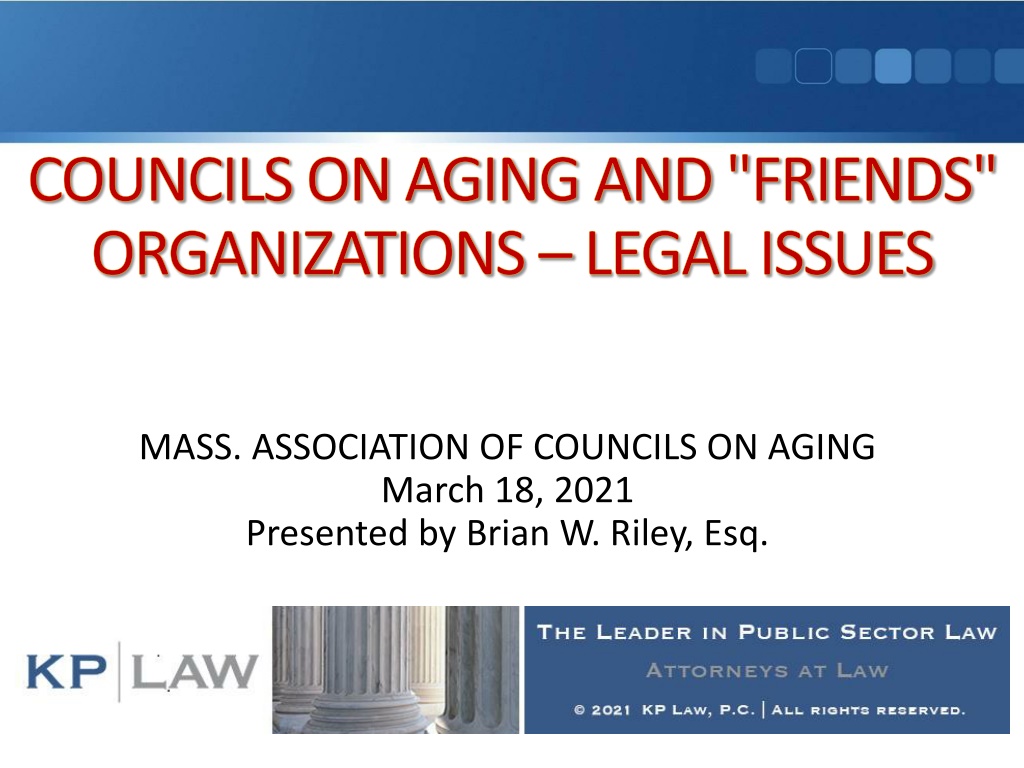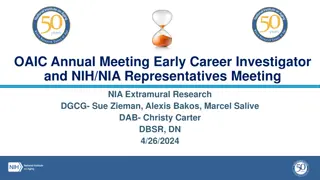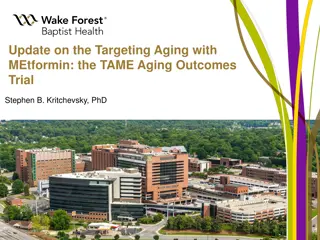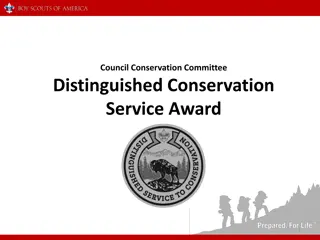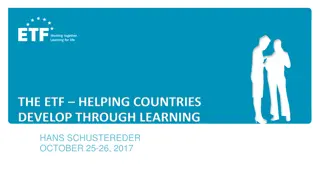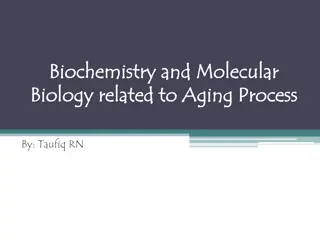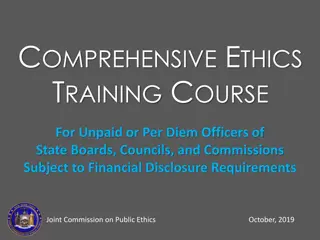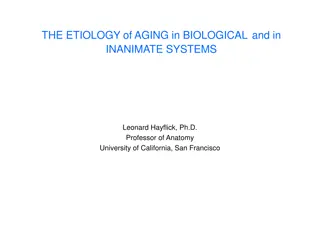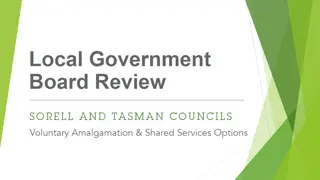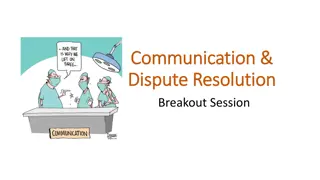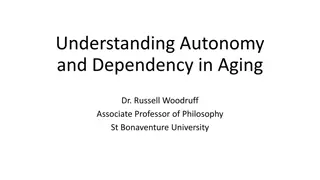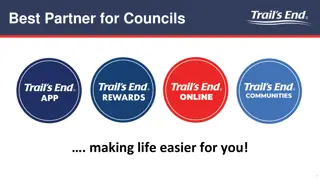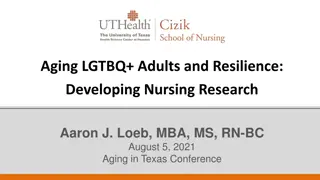Legal and Organizational Guidelines for Councils on Aging and Friends Organizations
This presentation covers legal issues related to Councils on Aging (COAs) and affiliated nonprofit organizations, including topics such as corporate establishment, fundraising, conflict of interest, handling donated funds, and interactions with state divisions. Details on establishing a nonprofit, bylaws, annual reporting, oversight by Attorney General's Public Charities Division, tax-exempt status, and the importance of bylaws are discussed. The content emphasizes compliance with state regulations and best practices for governance in these organizations.
Download Presentation

Please find below an Image/Link to download the presentation.
The content on the website is provided AS IS for your information and personal use only. It may not be sold, licensed, or shared on other websites without obtaining consent from the author. Download presentation by click this link. If you encounter any issues during the download, it is possible that the publisher has removed the file from their server.
E N D
Presentation Transcript
COUNCILS ON AGING AND "FRIENDS" ORGANIZATIONS LEGAL ISSUES MASS. ASSOCIATION OF COUNCILS ON AGING March 18, 2021 Presented by Brian W. Riley, Esq.
A Few Words About This Presentation Issues concerning COAs and affiliated nonprofit organizations Nonprofits: establishment & purpose, corporate filings, bylaws Fundraising by nonprofits Council on Aging = public officials Subject to Conflict of Interest, Open Meeting & Public Records Laws Handling donated funds and items: G.L. c.44, 53A and 53B Raffles Interactions
Corporate establishment Secretary of States Corporations Division Articles of Incorporation: largely administrative purpose of org., identity of directors/officers. Purpose limits how donations may be made if limited to supporting COA, cannot donate to any other cause. Annual Reports: verifies current information. Bylaws not required to be filed.
Attorney Generals Public Charities Division More substantive oversight of nonprofits. Registration forms, IRS status, copy of Art. Of Incorporation and bylaws. Form PC - annual financial statement of donations, administrative costs, compensation of officers (if any), net assets, methods of fundraising etc., and filing fee. *If nonprofit raises/receives less than $5,000 per year and officers not compensated, not required to file Form PC*
Tax Exempt Status Tax Exempt Status may apply for status with IRS and/or DOR. Limits ability to formally engage in political activities (e.g., ballot question for new Senior Center). Tax Exempt Status may apply for status with IRS
Bylaws Bylaws Bylaws typically set forth internal rules and procedures for the nonprofit corporation, touching on such issues as: the existence and responsibilities of nonprofit corporate officers and directors the size of the board of directors and the manner and term of their election how and when board meetings will be held, and who may call meetings how the board of directors will function how grant monies will be distributed (some donors require that the bylaws contain a provision barring any person who exercises supervisory powers to individually benefit from grant funds) G.L. c.180, 6A: Clerk must be MA resident. o o o o o
Fundraising Fundraising: Decreased state funding, Prop 2 = tight budgets. Annual Certificate of Solicitation from Public Charities Division (unless under $5,000 in donations). G.L. c.68, 19. Raffles and bazaars: Primarily G.L. c.271, 7A. Must be a nonprofit organization, registered with Public Charities Division, and in existence in MA for at least two years. Permits are obtained by applying to City or Town Clerk. Clerk forwards to Chief of Police to confirm applicant is entitled to conduct raffle.
Fundraising 'Raffle'', an arrangement for raising money by the sale of tickets, certain among which, as determined by chance after the sale, entitle the holders to prizes. ''Bazaar'', a place maintained by the sponsoring organization for disposal by means of chance of one or both of the following types of prizes: (1) merchandise, of any value, (2) cash awards, not to exceed $250 each. After event, file return with Lottery Commission, pay 5% of gross proceeds as tax. Additional AG regulations if tickets cost more than $10. Currently, online raffles are not permitted.
Councils on Aging As public statutory board [G.L. c.40, 8B], COA is subject to Conflict of Interest, Open Meeting and Public Records Laws. Friends organizations should bear this in mind when interacting with COA, seeking feedback, or submitting paperwork or donations. Open Meeting Law: any meeting of COA, if quorum is present, must have agenda posted 48 hours in advance, limits what may be discussed. Minutes, online training. Public Records Law: unless specific exemption applies, records possessed by COA are public records. Conflict of Interest Law: Limitations on what officials may do privately. Cannot act on matters in which business organization they serve as officer/director has financial interest [*generally would not include Friends orgs.*]; cannot act as agent for another individual or organization in interacting with city/town.
Conflict of Interest Issues Agency or financial interest issues arise if COA member is also officer of a Friends group and contacts municipality; let other officers handle this. If Friends making donation to COA, this is a financial interest. One exception created by State Ethics Commission regulation, 930 CMR 6.08: Exemption for Board Members Appointed by Public Agency (1) Purpose. The purpose of 930 CMR 6.08 is to allow a non-elected public employee appointed to the board of a nonprofit public interest organization by the employee's employing public agency, to serve as the employing public agency's representative on such board, and to participate fully in board matters and in agency matters. (2) Exemption. A non-elected public employee who has been appointed to the board of a nonprofit public interest organization by the employee's employing public agency may participate in particular matters in which the organization has a financial interest without violating M.G.L. c. 268A, 6, 13, 19, or 23.
DONATIONS Donations to COA Donation of funds governed by G.L. c.44, 53A, and tangible property by 53A . Tangible property = city council/town council/board of selectmen must vote to approve; presumably would turn over to COA and Senior Center after acceptance. Funds: may be accepted by any officer or department, but requires approval of city council/mayor or board of selectmen to expend the funds. Held by municipal Treasurer in separate account, no appropriation needed. May only be expended for specific purposes of gift donor controls purpose.
RELATIONSHIPS Relationships between COA and Friends group Nonprofits provide financial support (fundraising and donation, finding corporate sponsorships) and/or programmatic support (volunteering at Senior Center, staffing events, chaperoning, etc.). Avoiding Problems between two groups: Maintain regular communication understanding of roles and expectations of each group. Structural relationship shared and separate priorities; seek integration of the mission of both groups. Avoid too little or too much autonomy of nonprofit seek balance of Friends group running its own show and having it tailored to COA s wants/needs.
COA Statutory Duties Council on Aging: statutory office (G.L. c.40, 8B), coordinating and carrying out programs to meet problems and needs of elder residents. COA must be the one establishing programs and agendas; responsible for contact with and reporting to Executive Office of Elder Affairs; appointing/supervision of employees. Important for friends groups to allow COA to perform these tasks.
Questions? QueBrian W. Riley, Esq. KP Law, P.C. 101 Arch Street, 12th Floor Boston, MA 02110 (617) 556-0007 Briley@k-plaw.com www.k-plaw.com stions?
